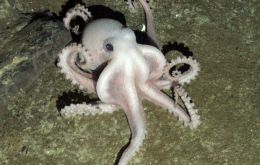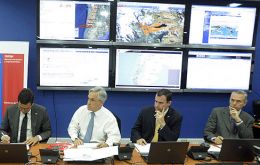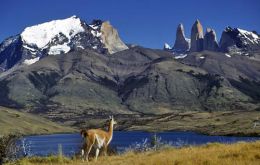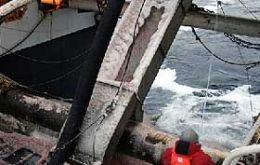MercoPress. South Atlantic News Agency
Environment
-
Wednesday, January 4th 2012 - 17:41 UTC
Hybrid sharks in Australia indicate animals are adapting to climate change

Researchers have discovered the world's first hybrid sharks in Australian waters, indicating that animals are adapting to climate change for survival.
-
Wednesday, January 4th 2012 - 17:37 UTC
Pale octopus and yeti crabs found surrounding hydrothermal vents near Antarctica

Communities of species previously unknown to science have been discovered on the seafloor near Antarctica, clustered in the hot, dark environment surrounding hydrothermal vents.
-
Wednesday, January 4th 2012 - 05:47 UTC
Piñera announces partial reopening of Torres del Paine Park under strict controls

Chilean President Sebastián Piñera assured on Tuesday that several forest fires in Torres del Paine, Chilean Patagonia, were “under control” and announced that the national park will partially reopen as of Wednesday. It has remained closed since last Friday when the fire went out of control.
-
Tuesday, January 3rd 2012 - 00:52 UTC
Piñera says Torres del Paine fire under control; 12.795 hectares lost to the blaze

The fire that broke out in the Chilean Patagonia Torres del Paine national park forest is under control due to the effort of hundreds of fire-fighters and improved climatic conditions, Chilean President Sebastián Piñera announced Monday afternoon.
The Israeli citizen accused of having caused the fire denied his involvement. -
Monday, January 2nd 2012 - 03:46 UTC
Victory for Chavez in arbitration with Exxon Mobil over assets’ nationalization

An international arbitration panel has awarded US oil giant Exxon Mobil Corp 908 million dollars in compensation for Venezuela's 2007 nationalization of assets, less than 10% of what it sought in a dispute that pitted a top global oil company against one of the world's largest oil exporters.
-
Saturday, December 31st 2011 - 03:26 UTC
UK awards 46 offshore hydrocarbons exploratory licences in controversial areas

UK government has awarded 46 new offshore exploratory drilling licences to firms, including Shell and Centrica, looking for oil and gas. The awards were initially held back due to environmental concerns.
-
Friday, December 30th 2011 - 21:17 UTC
Forest fire in Torres del Pain out of control because of the strong winds

Chile declared on Friday “catastrophe zone” the extreme south province of Ultima Esperanza where a forest fire, so far out of control, has ravaged over 9.000 hectares of pristine flora from the Torres del Paine national park.
-
Thursday, December 29th 2011 - 23:12 UTC
Tourists evacuated from Torres del Paine park threatened by forest fire

Twenty tourists had to be evacuated from the Torres del Paine national park in Chilean Patagonia following the outbreak of a forest fire that has extended to over twenty hectares because of strong winds and difficult access for fire-fighters, reports the local press.
-
Thursday, December 29th 2011 - 22:07 UTC
Scientists establish critical benchmark link for seabirds and available food

An international group of scientists has shown that many seabirds begin to suffer when the food available for them in the ocean declines below a critical level. This level is about one-third of the maximum measured amount of food available. They have found that this critical level is about the same for seabird species around the world. Their study — the most comprehensive ever undertaken — covers birds from the Arctic to the Antarctic and from the Pacific to the Atlantic.
-
Tuesday, December 27th 2011 - 13:54 UTC
Rousseff reiterates pledge to eliminate extreme poverty in Brazil by 2014

President Dilma Rousseff, about to complete her first year in office, reiterated she remains committed to eliminate extreme poverty in Brazil by the end of her term in 2013.
